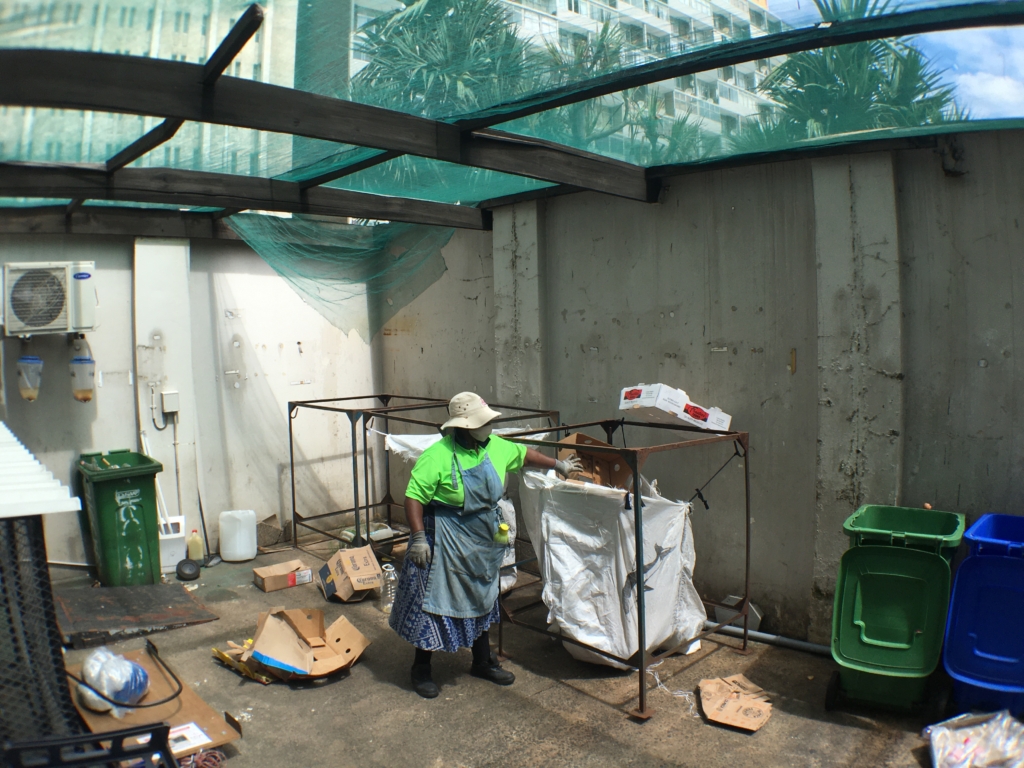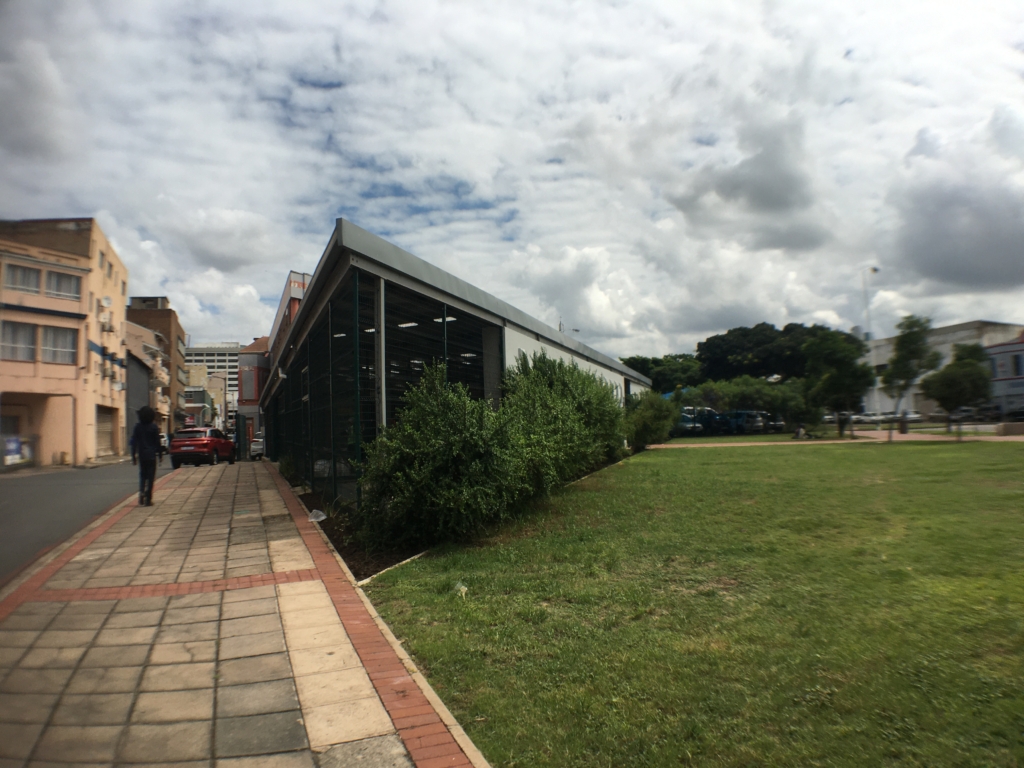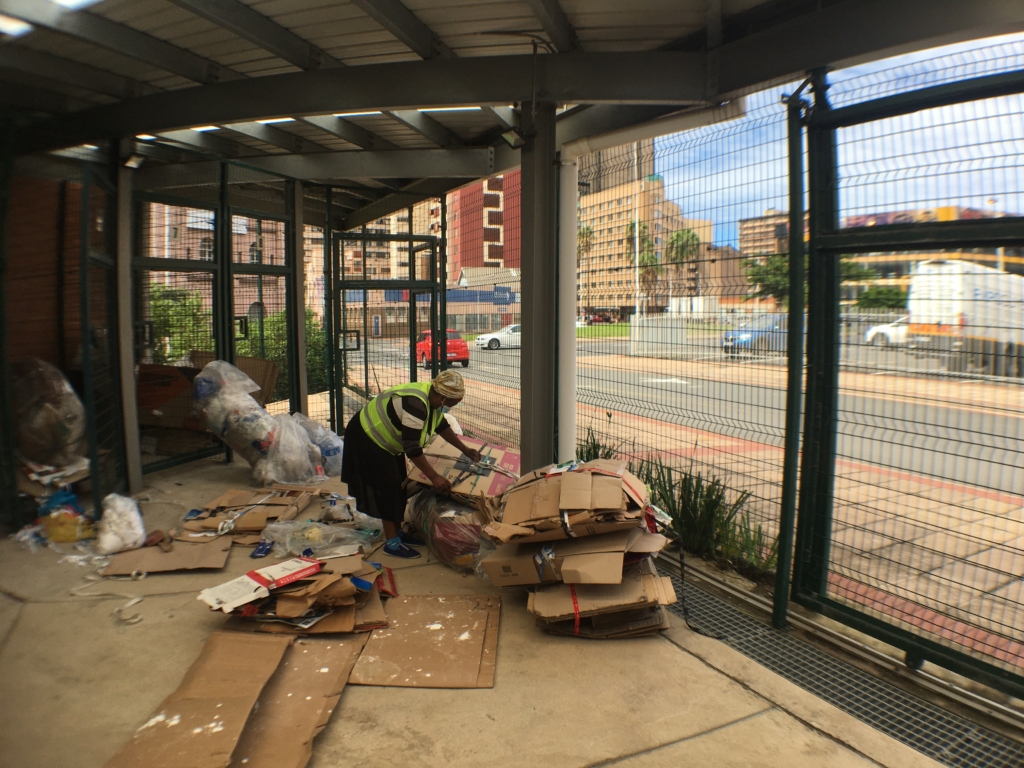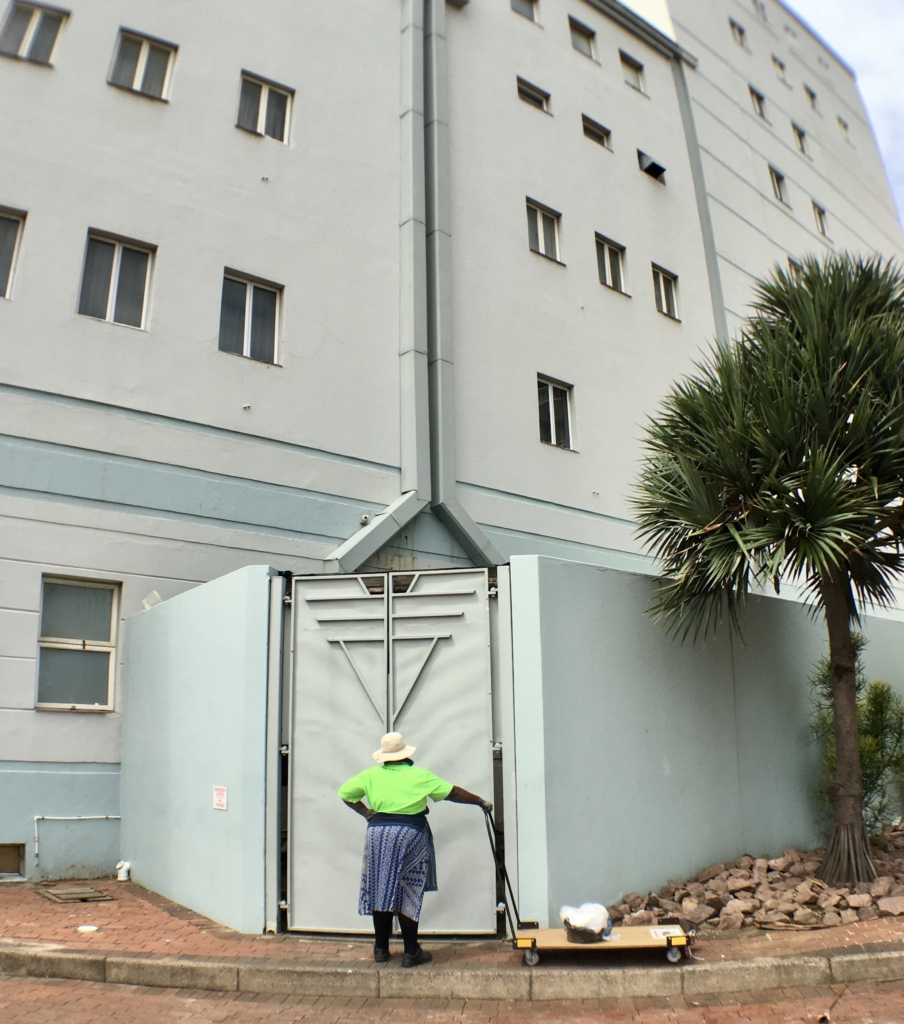Chloë Lead and Matthew Robbins
When we arrive Sibongile Muthwa is putting on her gloves. She wears her safety boots, her hat is tightly fastened with a drawstring and her bottle of water sits snugly within her apron pocket. In front of her sits her cart, laden with all the strapping, rope and plastic bags she’ll need for her midday collection. She pulls her cart – with its high-vis safety strips – out into the Durban streets. As she turns away from us, the words on the back of her lumo-green shirt become visible “Friends of Recyclers.”
Informal recycling in Durban (and, indeed, the rest of the world) is a critical intervention in dealing with the colossal quantities of waste generated by urban life. Conversations on the issue of climate change and waste reduction are gaining momentum around the world. However, it is important to reflect on how these conversations often fail to consider the vast contributions made by those working in the informal economy. These contributions are particularly crucial in dense urban environments, where existing municipal systems fail to sufficiently prioritise the issue of waste reduction. Informal recyclers save South Africa’s municipalities approximately R750 million in landfill space a year.1
Without informal recyclers there would be no recycling economy in South Africa and many South African landfills would have filled their capacities and been forced to close long ago.2
In addition to its vital environmental function, as a job, recycling is a means for informal recyclers to support themselves and their dependents in the midst of precarious circumstances. According to a report by the World Bank HYPERLINK (dated 9 March 2022), South Africa is, once again, ‘the most unequal country in the world’. The large scale of informal recycling in South Africa is thus owing to the country’s outrageous income inequality and rampant unemployment rates. Nevertheless, like most jobs in the informal economy, informal recycling has emerged as an innovative way to gain a livelihood, by addressing the fault lines in the existing formal systems.
Despite the staggering contributions made by informal recyclers, as a job, it is rife with challenges – perhaps most obvious is the dual concern of safety and dignity:
The health hazards of informal recycling are myriad. Digging through unsorted waste, it is not uncommon to come across broken glass mixed in with foetid wet-waste, which in turn does little for the dignity of this profession. The plight of travelling along and across busy roads – frequently in amongst the traffic due to the car-centric nature of our urban planning – makes the work physically demanding (especially when transporting heavy loads) and risky in terms of traffic accidents. This latter point is illustrated by the tragic death of renowned Durban recycler Afrika Ntuli in 2016, who was hit by a speeding vehicle at a pedestrian crossing.
The issue of dignity is also an important one, as both a right and value safeguarded by the South African Constitution. Not only should this crucial work be celebrated as a matter of course, but a lack of dignity in this line of work is also a matter of practicality. When the work of recycling is undignified, and perceived as such, recycling becomes a less viable pathway for making a livelihood. It is certainly a less attractive prospect for those in need of work, and the waste-buyers remain inclined to take advantage of the recyclers – who do the physical labour of searching for, collecting, hauling and sorting the recyclable waste. Recyclers on the street are also then more vulnerable to the prejudice of the state, business owners and general public, being seen as a nuisance and symptom of city filth and thus susceptible to being punitively dissuaded from their work.
Many informal recyclers continue to face harassment, discrimination and eviction by the police. This is usually due to the fact that most informal recyclers have no choice but to make use of public space to store and sort their waste. In Johannesburg, it has become commonplace for metro police to raid and burn recyclers’ stocks, as well as personal belongings (such as identity documents). It is this sort of condemnable conduct that strips a person of their inherent human dignity.
The competitive nature of their work also has an impact on the dignity and safety of informal recyclers, with many recyclers choosing to sleep on their trolley-loads at night to prevent them from being stolen by other recyclers; and in many cases hoard their loads under bridges in order to be out of the sight of prying police eyes.
AeT has, for some time now, been working alongside informal recyclers in improving the safety and dignity of their work.
The first way in which the ‘Friends of Recyclers’ initiative tackles some of the challenges faced by informal recyclers is by providing something of a uniform for recyclers – a luminous green golf shirt, a protective hat, safety boots, an apron and gloves. In speaking to a recycler at the Palmer street recycling facility, it became clear that the recyclers feel that their work has become safer and more hygienic on account of their protective uniform.
“You see the apron, it helps us to be recognised on the street. The shoes help a lot when we are at the hotels. There are a lot of bottles and it’s not safe. There’s a lot of sun so the hat does really help… The gloves especially! When we’re handling things. [She points to the luminous green shirt] It helps to put something that’s bright so that people can see us from far”
The uniform also serves to make the recyclers a more dignified, visible and recognisable part of the city they serve. In turn this has drastically improved the way in which they are perceived by other city-users, as well as their interactions. While we followed Sibongile we witnessed a few of her interactions with others working in the city. A bank security guard heard her approaching with her cart, and stepped forward to give her a friendly wave from the other side of the road.
“It helps a lot. That’s how they recognise me… through my uniform (…) The security guards recognise me… sometimes when they see cardboard or plastic and keep it and give it to me”
In addition to the distribution of uniforms, AeT has been involved in the design and operation of a recycling facility. Built on a municipal site located in Palmer Street, Durban CBD, this facility provides a small group of recyclers with a secure depot for the temporary storage and sorting of their collected waste. Each recycler is given exclusive access to her own cage for her personal belongings and there is a large common space for the sorting of waste. On specific days of the week, waste collectors arrive with their trucks, weigh each recycler’s load according to the different categories of waste, and then pay them in cash. The facility provides the recyclers with ablution amenities and a substantial washing station. Moreover, the facility has fences and security guards to ensure that the recyclers feel safe and that their waste-collections are not stolen. It is kept in a clean state – with the recyclers taking pride in their place of work. The facility is connected to a green public space with beautiful landscaping, trees and benches.
“I moved to this place. And I just wore a uniform and they gave us a trolley and that gave us dignity on the street.”
Alongside this, and other projects like the ongoing co-designed recycling cart used by some recyclers, AeT has recently initiated a relationship with a chain of Durban beachfront hotels. This involves connecting informal recyclers to these larger-scale generators of waste as a low-cost service for the hotels while allowing the recyclers access to huge volumes of waste which are separated at source, thus increasing their income while requiring less labour in the form of sorting. This is an incredibly positive step towards creating a safer and more dignified profession for informal recyclers across the city and has been acknowledged as such by Sibongile, who explained how her relationship with the hotel has allowed her access to much larger quantities of more valuable waste. A key element of these newly-formed relationships is the practice of “separation at source”, which means that recyclers do not have to dig through undifferentiated waste – an undignified health hazard of note.
Not only has Sibongile’s income begun to improve, but she feels respected by the people she encounters while doing her work, from the security guard she meets at the gate to the hotel manager.
“It’s much better than before. Now I get more valuable waste. And when it’s a lot I can make a lot more money (…) They treat me very well… even the boss of the hotel.”
Overall, Sibongile was happy to discuss how working alongside AeT has afforded her greater safety and dignity in going about her work, and how this has served to improve her life as an informal recycler – a job she pointed out was environmentally important and one which makes waste management easier for the municipality.
“AeT has helped me a lot! A lot. AeT took me and put me in this municipal area. And I’m working nicely… much better than working from home. And I earn well now. (…) We feel safe here with the security.”
Sibongile was emphatic in stating her wish for the city to recognise the work that she and other recyclers do, as it helps the municipality and the environment. While the situation is improving for some informal recyclers through AeT’s assistance, there is further work to be done in conscientizing the city and citizens around the valuable services provided by these waste management professionals.
“I really want the Municipality to know that I’m helping them because this is the waste that the Municipality would have to collect but I’m the one collecting it (…) I would like for the Municipality to recognise how valuable our work is.”
However, the challenges faced by informal recyclers are not merely the prerogative of the state. As individuals and businesses, we can easily assist the work of recyclers through practising ‘separation at source’ whenever we generate waste.
When asked if she realises how valuable her work is for the environment Sibongile responded:
“I see how valuable it is. Because the plastic when it flies in the wind it goes to the sea it causes a lot of problems or it goes into sewage but instead I take it and collect it and recycle it”
- WIEGO, Waste Integration in South Africa (WISA) https://www.wiego.org/waste-integration-south-africa-wisa
- Daily Maverick, Michelle Banda ‘A linchpin of SA’s recycling economy, informal waste pickers should be integrated into the mainstream economy’ January 2022 https://www.dailymaverick.co.za/article/2022-01-20-a-linchpin-of-sas-recycling-economy-informal-waste-pickers-should-be-integrated-into-the-mainstream-economy/







